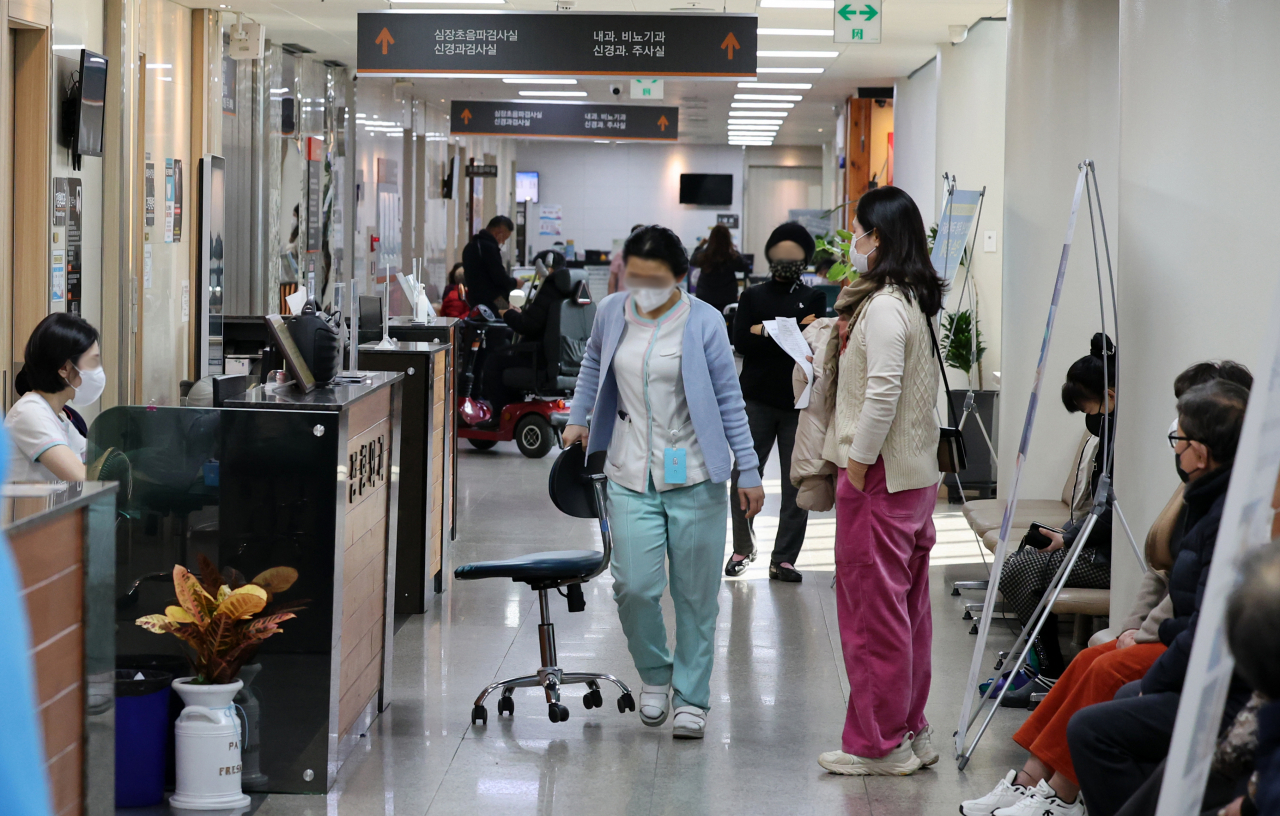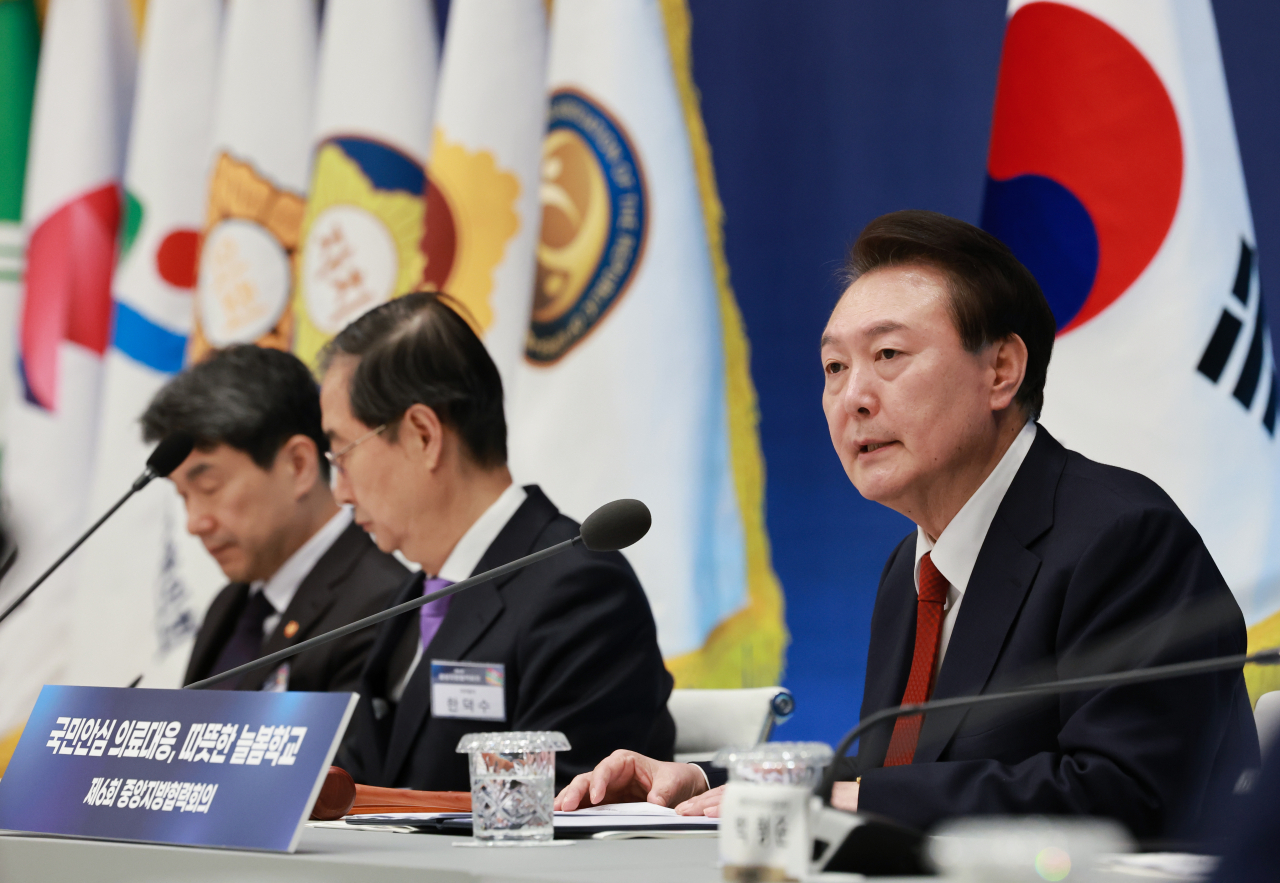Yoon says 2,000 increase in med school quota non-negotiable
Health Ministry files complaint seeking police probe against doctors
By Lee Jaeeun, Son Ji-hyoungPublished : Feb. 27, 2024 - 14:36

President Yoon Suk Yeol on Tuesday remained set on his push for an increase in the annual medical school enrollment quota of 2,000, saying the number "is non-negotiable."
"No excuses can justify (doctors') collective action of taking people's health hostage and posing a threat to people's lives," Yoon told some 100 participants including mayors and provincial governors at the Central and Local Government Cooperation Council meeting at Cheong Wa Dae, the former presidential office, in Seoul.
He also blamed South Korea's chronic doctor shortage for the disparities in the availability of health care services between urban areas and remote villages.
At the meeting, Yoon said that increasing the annual quota by 2,000 according to the plan is a critical step to preventing further collapses in the medical infrastructure across the country.
"There was a time when a balanced medical infrastructure was in place across South Korea concerning critical care services," Yoon said.
"But the infrastructure collapsed one day, because the number of doctors was reduced, and the reduced number of doctors flocked to the medical fields (they found lucrative). What if the number of doctors had risen in line with greater medical needs?"
Yoon's comments came as trainee doctors entered the second week of their protest against the quota hike plan by staging a walkout. Nearly 10,000 trainee doctors have so far left work or training, triggering a serious staffing shortage in first-tier medical facilities.
Yoon said the phenomenon was reminiscent of the liberal Kim Dae-jung administration's decision to increase the number of examinees that pass the bar examination by 50 percent to 1,000 in two years by 2001. Yoon was formerly a prosecutor before he was elected President in 2022.
"The decision then to increase the number of lawyers ... enabled South Korean lawyers to meet the needs of specialty fields, beating out foreign competitors," Yoon said, adding the addition of lawyers in the fields of trade, the environment, intellectual property and investment.
Later in the afternoon, the Health Ministry announced that it had filed a complaint with the police to request investigations into doctors who were leading collective action on suspicions of violating medical and criminal law.

Doctors meanwhile were intensifying their efforts to convince the public of the rationale behind their opposition to the government's medical school quota expansion plan. However, some of their remarks have sparked even more heated criticism.
A Korean doctor surnamed Kim in Busan metropolitan city has been criticized for saying to people on his YouTube channel that what the country needs is more caregivers, not more doctors.
His remark triggered a series of critical comments, saying “Aren't elderly people also people?” and “Nursing homes need doctors, too.”
Kim is not alone. Earlier, Lee Dong-wook, who heads the Gyeonggi Provincial Medical Association, came under fire for saying people like “smart and intelligent physicians.”
“If you select students with low grades and force them to work, their motivation will decrease. Would anyone want to receive medical treatment from such doctors?” he said at a prerecorded show aired through MBC last week.
“(With the increased medical school quota), we have no choice but to select (medical school) candidates with very low grades for the admissions for students. Those who rank between No. 20-30 in their classes would be able to go (to medical school), but the public would not want them (as doctors).”
Some have raised concerns that Lee's remarks have exposed the extent of elitism among Korean doctors.
"Their collective egoism is worsening. The public is outraged by the deep-rooted privilege and arrogance of doctors who attempt to exert authority over the people and the law, disregarding patient suffering," a statement from local civic group the Citizens' Coalition for Economic Justice read.
Vice Health Minister Park Min-soo said at a briefing, “I don't agree (with the idea that only the smartest people should be doctors). ... Rather, I think good doctors are those who have a sense of mission as doctors through good education."
“The countryside doesn’t have a shortage of doctors. The provinces simply have a lower standard of living," said Joo Su-ho, the head of the emergency committee's public relations council, in a Facebook post on Feb. 8 regarding the shortage of doctors in the provinces and rural areas. Later, Joo reportedly deleted the post after receiving backlash online.
Furthermore, the remarks made in a Facebook post by Noh Hwan-kyu, the former chair of the Korea Medical Association, an interest group of licensed doctors, went viral last week as he said the government cannot win against doctors. He pointed out that the record has shown that patients who died in critical condition during a strike 24 years ago had been abandoned for days.
The KMA believes that much of this negative public opinion stems from “misunderstandings,” and it says it plans to strengthen its public relations efforts to explain the logic behind the opposition to expanding the medical school quota.
“It is most important to inform the public of the problems of increasing the annual medical quota by 2,000, so we will also focus on informing them of the irrationality of the medical school increase. We plan to actively promote it to the public," said KMA emergency committee chairperson Kim Taek-woo.
The government has asserted that the number of doctors in South Korea relative to the size of the population is among the lowest in the developed world.
The government referred to the 2021 Organization for Economic Cooperation Health Statistics report, in which Korea recorded 2.6 active clinicians per 1,000 people, far lower than Austria, Norway and Germany with 5.4, 5.2 and 4.5 clinicians per 1,000 individuals, respectively.
The Ministry of Health and Welfare said that 8,939 trainee doctors, or 72.7 percent of the total, have walked off the job as of Monday evening. The number of trainee doctors who submitted their resignation came to 9,909.




















![[Today’s K-pop] Treasure to publish magazine for debut anniversary](http://res.heraldm.com/phpwas/restmb_idxmake.php?idx=642&simg=/content/image/2024/07/26/20240726050551_0.jpg&u=)